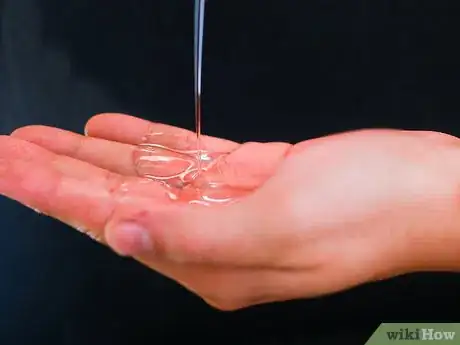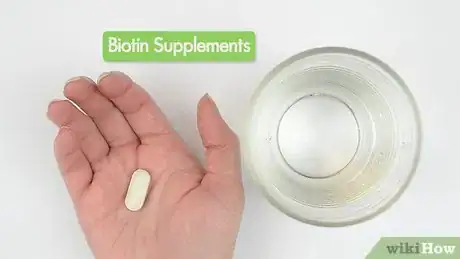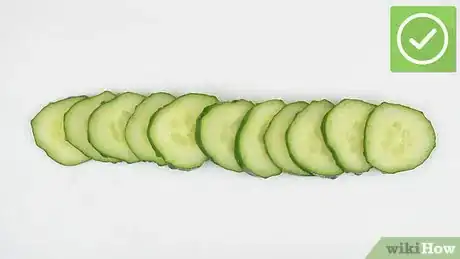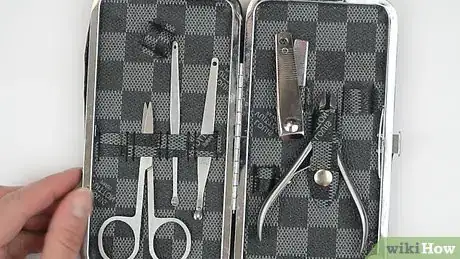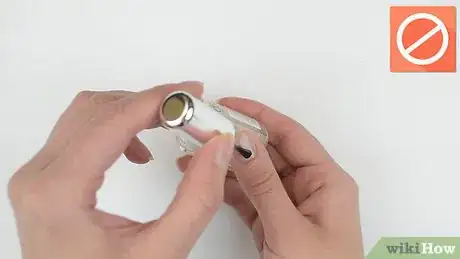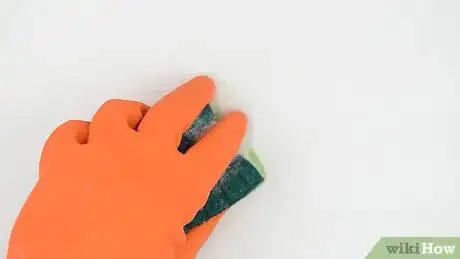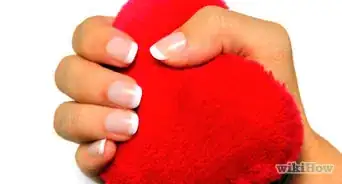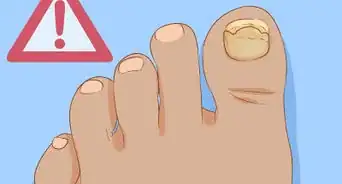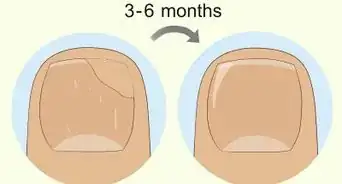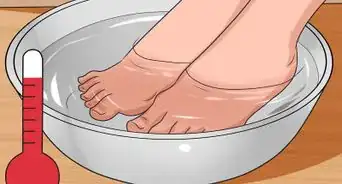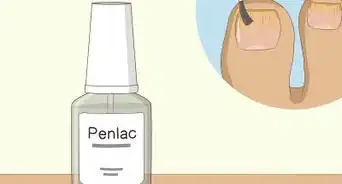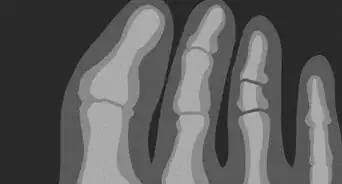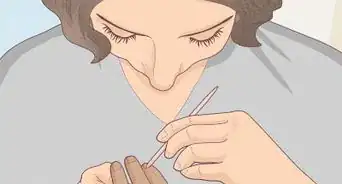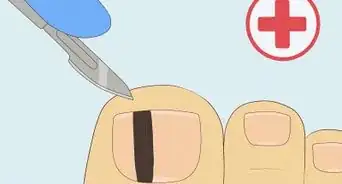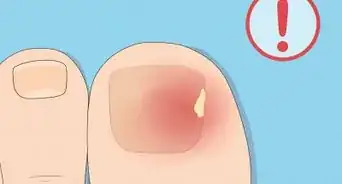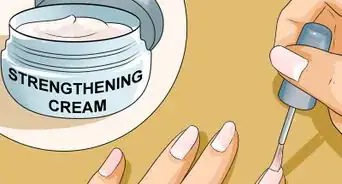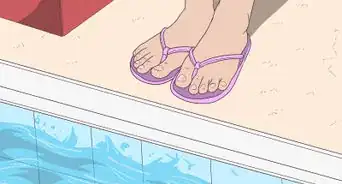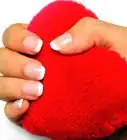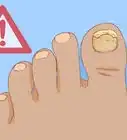This article was co-authored by Mohiba Tareen, MD. Mohiba Tareen is a board certified Dermatologist and the founder of Tareen Dermatology located in Roseville, Maplewood and Faribault, Minnesota. Dr. Tareen completed medical school at the University of Michigan in Ann Arbor, where she was inducted into the prestigious Alpha Omega Alpha honor society. While a dermatology resident at Columbia University in New York City, she won the Conrad Stritzler award of the New York Dermatologic Society and was published in The New England Journal of Medicine. Dr. Tareen then completed a procedural fellowship which focused on dermatologic surgery, laser, and cosmetic dermatology.
There are 10 references cited in this article, which can be found at the bottom of the page.
wikiHow marks an article as reader-approved once it receives enough positive feedback. In this case, 100% of readers who voted found the article helpful, earning it our reader-approved status.
This article has been viewed 272,327 times.
Weak fingernails can lead to splits, ragged edges, or painful hangnails. Despite many popular and dubious beauty tips, there are really only a few solutions that work. For most people on a healthy diet, daily moisturizing and a switch to gentle nail care routines are the only changes worth considering.
Steps
Strengthening Nails
-
1Moisturize the cuticles with oil. According to board-certified dermatologist Mohiba Tareen, "Your nails need to be moisturized regularly, just like your hands, feet, and the rest of your body. Every time you moisturize your hands, moisturize your cuticles. That way, your new nail growth will always be nourished, so they should grow in stronger." To reduce splitting and breaking, rub a moisturizing cream or olive oil into the cuticles daily. Petroleum jelly or a thick, greasy hand lotion that seals in moisture should do the trick as well.[1]
-
2Consider biotin supplements. Biotin may not have much of an effect unless you have severely brittle nails, but it may be worth a try. A daily dose of 30 mcg is enough to avoid deficiency.[2] In fact, board-certified dermatologist Mohiba Tareen actually advises "against taking high doses of biotin, since it can interfere with certain medical tests." Although some studies support the use of biotin for strengthening the nails, more research needs to be done to determine whether it is safe and effective.[3]
- You can also increase your biotin intake naturally by consuming more eggs, almonds, sweet potatoes, and other dietary sources of this B vitamin.
- Talk to a doctor first before you start taking any new supplements or make any major dietary changes.[4]
Advertisement -
3File carefully. Shape nails with a fine-grit file (at least 180 grit), avoiding metal files and rough emery boards. File in one direction only, never back and forth. Smoothing away nicks and rough edges can help prevent breakage, but stick to this careful approach.[5]
- Make sure your nails are completely dry before filing. Always wait to file for at least 10 minutes after showering or doing the dishes.
- Try shaping long nails to an oval, rather than a point or square, to reduce pressure.
- Never file down the sides of nails, as it can lead to infection and seriously weaken your nails.
-
4Eat a healthy diet. Many beauty websites and magazines tout specific foods or supplements. There is little to no evidence that most of these work. In general, a balanced diet with plenty of vitamins and minerals from food should be enough to avoid nail problems. Some people may benefit from calcium, iron, zinc, or vitamin B supplements, but only if their diet is low in these substances.[6] Board-certified dermatologist Mohiba Tareen also suggests "eating plenty of protein to support your nail health, since nails are made of a protein called keratin."
- Don't believe myths about gelatin or garlic strengthening nails. These have no noticeable effect when eaten or used to soak the nails.[7]
Preventing Damage
-
1Use your own manicure tools only. Anything that touches your nails should be used on your nails only. Sharing files, brushes, and other tools can spread infection, leading to puffy red cuticles and weak nails.[8]
- Even a professional nail salon may not clean its instruments properly. Bring your own tools or make sure the salon staff sterilizes their instruments.
-
2Leave your cuticles alone. The cuticles at the base of your nails protect against fungi and bacteria. Cutting them can lead to an infection that permanently damages the nail bed.[9]
- Fake fingernails that extend over the cuticles also cause harm. Use fake nail tips instead.
-
3Avoid nail hardeners. These products make untested claims and are rarely worth the risks. Even if they succeed in hardening your nails, the end result may be brittle and easily broken.[10]
-
4Switch nail polish brands. Some nail polishes, especially ones that contain formaldehyde, make the nail brittle and dry.[11] Try switching to a different brand for a few weeks and see what happens. Avoid quick-drying formulas, as these can further dry out your nails.
- Some dermatologists recommend leaving nail polish on for no longer than five days.
-
5Take care when removing polish. Never chip or peel off the polish. Always soak it with a nail polish remover until you can easily scrub it away. These polish removers do dry out your nail, so moisturize afterward with nail cream, thick hand cream, petroleum jelly, or olive oil.
- Unless you are removing acrylic nails, look for a non-acetone formula of nail polish remover.
-
6Minimize wear and tear. Manual labor, housework frequent hand washing, and exposure to cleaning chemicals can all tear your nails. Wear gloves during these activities when possible.[12]
- If nail stress is unavoidable, possibly due to work-required hand washing, or playing classical guitar, you may need to moisturize several times daily.
- Type with the pads of your fingers, not your nails.
-
7Go without polish 1-2 times a month to let your nails breathe. Board-certified dermatologist Mohiba Tareen agrees that "the chronic chemical exposure of nail polish and nail polish remover dries out your nails over time." She also advises "minimizing gel and acrylic polishes overall. Instead, alternate between a regular nail polish and a gel-type polish, which has more chemicals." When you do wear polish, always use a protective base coat and apply your polish in thin layers.
Expert Q&A
Did you know you can get expert answers for this article?
Unlock expert answers by supporting wikiHow
-
QuestionWhat should I eat for strong nails?
 Laura MartinLaura Martin is a Licensed Cosmetologist in Georgia. She has been a hair stylist since 2007 and a cosmetology teacher since 2013.
Laura MartinLaura Martin is a Licensed Cosmetologist in Georgia. She has been a hair stylist since 2007 and a cosmetology teacher since 2013.
Licensed Cosmetologist
-
QuestionHow do you strengthen your nails?
 Laura MartinLaura Martin is a Licensed Cosmetologist in Georgia. She has been a hair stylist since 2007 and a cosmetology teacher since 2013.
Laura MartinLaura Martin is a Licensed Cosmetologist in Georgia. She has been a hair stylist since 2007 and a cosmetology teacher since 2013.
Licensed Cosmetologist Eating a protein-rich diet and drinking plenty of water are essential. You can also try taking a biotin supplement. Nail care also matters a lot. Be gentle with your cuticles and make sure you are filing correctly, not sawing at the edges. You may also want to massage your nail area with cuticle oil which will help fortify them and keep them flexible, which reduces breakage.
Eating a protein-rich diet and drinking plenty of water are essential. You can also try taking a biotin supplement. Nail care also matters a lot. Be gentle with your cuticles and make sure you are filing correctly, not sawing at the edges. You may also want to massage your nail area with cuticle oil which will help fortify them and keep them flexible, which reduces breakage. -
QuestionHow can I make my nails stronger and longer?
 Mohiba Tareen, MDMohiba Tareen is a board certified Dermatologist and the founder of Tareen Dermatology located in Roseville, Maplewood and Faribault, Minnesota. Dr. Tareen completed medical school at the University of Michigan in Ann Arbor, where she was inducted into the prestigious Alpha Omega Alpha honor society. While a dermatology resident at Columbia University in New York City, she won the Conrad Stritzler award of the New York Dermatologic Society and was published in The New England Journal of Medicine. Dr. Tareen then completed a procedural fellowship which focused on dermatologic surgery, laser, and cosmetic dermatology.
Mohiba Tareen, MDMohiba Tareen is a board certified Dermatologist and the founder of Tareen Dermatology located in Roseville, Maplewood and Faribault, Minnesota. Dr. Tareen completed medical school at the University of Michigan in Ann Arbor, where she was inducted into the prestigious Alpha Omega Alpha honor society. While a dermatology resident at Columbia University in New York City, she won the Conrad Stritzler award of the New York Dermatologic Society and was published in The New England Journal of Medicine. Dr. Tareen then completed a procedural fellowship which focused on dermatologic surgery, laser, and cosmetic dermatology.
FAAD Board Certified Dermatologist
Warnings
- Biting your nails leaves ragged tears. Check out this article for advice on breaking the habit.⧼thumbs_response⧽
- Rarely, weak nails are a sign of an underlying disease.[14] Talk to a doctor if none of this advice works for you.⧼thumbs_response⧽
References
- ↑ http://www.webmd.com/beauty/nails/more-beautiful-nails-a-dozen-tips
- ↑ http://www.nlm.nih.gov/medlineplus/druginfo/natural/313.html
- ↑ https://ods.od.nih.gov/factsheets/Biotin-HealthProfessional/
- ↑ http://www.nlm.nih.gov/medlineplus/druginfo/natural/313.html
- ↑ https://www.aad.org/public/everyday-care/nail-care-secrets/basics/how-to-trim-nails
- ↑ https://www.betterhealth.vic.gov.au/health/conditionsandtreatments/nails-fingernail-and-toenail-problems
- ↑ https://www.aad.org/public/everyday-care/nail-care-secrets/basics/pedicures/gel-manicures
- ↑ http://www.webmd.com/beauty/nails/more-beautiful-nails-a-dozen-tips
- ↑ http://www.webmd.com/beauty/nails/more-beautiful-nails-a-dozen-tips
- ↑ http://www.webmd.com/beauty/nails/more-beautiful-nails-a-dozen-tips
- ↑ https://www.fda.gov/cosmetics/cosmetic-products/nail-care-products#forma
- ↑ https://www.mayoclinic.org/healthy-lifestyle/adult-health/in-depth/nails/art-20044954
- ↑ Mohiba Tareen, MD. FAAD Board Certified Dermatologist. Expert Interview. 26 March 2020.
- ↑ https://share.upmc.com/2018/03/brittle-nails-causes-treatments/
About This Article
To get strong nails, rub olive oil or a thick hand cream into your cuticles to moisturize them and keep your nails from becoming brittle. Also, make sure to wear gloves when you do housework, since cleaning chemicals can damage your nails. If your nails are very weak, try taking a 2.5 mg biotin supplement each day to strengthen them. Then, when you file your nails, use a fine-grit emery board and file in only one direction, instead of back and forth, to prevent breakage. For tips from our Beauty reviewer on how to pick a nail polish that can strengthen your nails, read on!
